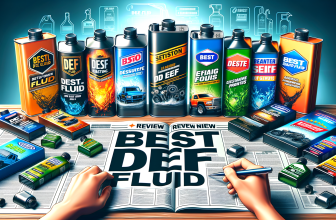
Our Top Picks
Wondering why your vehicle’s wheels aren’t spinning as smoothly as they should? It might be time to grease up those wheel bearings! Choosing the right grease can make all the difference, significantly impacting your wheel’s performance and lifespan. But with the market filled with numerous options, which grease should you trust to keep your bearings in tip-top shape?
Our #1 Top Pick: Valvoline SynPower Synthetic Automotive Bearing Grease
Valvoline’s SynPower Synthetic Grease offers excellent running performance, ensuring that your bearings remain lubricated in extreme temperatures ranging from -60 to 425 degrees Fahrenheit. Its synthetic formula enhances durability and helps prevent the breakdown under high-stress conditions. Suitable for both automotive and industrial applications, this grease boasts anti-wear additives and pressure agents to reduce friction and wear, providing you with peace of mind that your wheels will keep turning smoothly mile after mile.
Pick #2: Mobil 1 Synthetic Grease
Mobil 1 is a household name when it comes to automotive lubricants, and their Synthetic Grease lives up to the brand’s reputation. This superb grease is designed for longevity and protection against rust and scaling. It’s versatile and can be used across a wide variety of bearing types—including ball, roller, and plain bearings. Its water resistance and excellent adherence make it a solid choice for vehicles that see various weather conditions.
Pick #3: Timken Premium Red Wheel Bearing Grease
Known for their bearings, Timken also offers a premium red grease that optimizes the performance of rotary bearings. It combines corrosion inhibitors and anti-wear agents to combat the harshest of driving conditions. It’s especially well-suited for disc and drum applications, and its ability to resist water washout and maintain viscosity under heavy loads makes it a popular choice among professionals.
Pick #4: Lucas Oil Heavy Duty Grease
Lucas Oil has created an outstanding formula with their Heavy Duty Grease, designed to withstand high temperatures without losing its cohesive properties. This tacky grease provides excellent sealing capabilities, which is crucial for keeping contaminants out of bearing assemblies. Its unparalleled water resistance and load-bearing capabilities underpin its popularity among truckers and other heavy-duty vehicle operators.
Pick #5: Royal Purple Multi-Purpose Synthetic Grease
The Royal Purple Multi-Purpose Synthetic Grease is a versatile product, offering enhancement performance by increasing bearing life and improving fuel economy. Its synthetic formula is fortified with an additive technology called Synslide®, which provides lasting protection to bearings under almost any condition. Ideal for both automotive and industrial applications, it ensures that your vehicle’s bearings will withstand the tests of both time and terrain.
What to Know Before You Buy
- Compatibility: Check if the grease is compatible with the bearings of your specific vehicle and the conditions in which you drive.
- Temperature Range: Ensure that the grease can perform effectively across the temperature ranges you expect to encounter.
- Resistance Abilities: Look for water, rust, and corrosion resistance features to ensure long-term protection and performance.
- Additives: Additives such as anti-wear agents, pressure additives, and corrosion inhibitors can vastly enhance the grease’s properties.
- NLGI Rating: The National Lubricating Grease Institute (NLGI) rating indicates the grease’s thickness, which is crucial for various applications.
Factors to Consider Before Buying
- Vehicle Type: Whether you drive a light car, a heavy-duty truck, or operate industrial machinery, the type of vehicle will influence the kind of grease you select.
- Type of Driving: Off-road driving, high-speed highway runs, or frequent short trips all place different demands on wheel bearing grease.
- Grease Composition: Synthetic greases tend to offer broader temperature ranges and longer service life compared to their conventional counterparts.
- Application Method: Some greases come in tubes for grease guns, while others are in tubs or other containers. Your application method will influence convenience and ease of use.
Why Trust ChooseRight?
At ChooseRight, we take our product reviews seriously, embedding a commitment to accuracy and thoroughness in every analysis we conduct. For this roundup of the best wheel bearing greases, we dedicated considerable time to reading through thousands of customer reviews and weighing them alongside experts’ insights in the field. Our team scoured forums, reached out to automotive professionals, and relied on firsthand usage reports to bring you a list of the top wheel bearing greases that stand out for their quality, performance, and reliability.
Finishing Thoughts
Selecting the best wheel bearing grease is crucial for maintaining your vehicle’s wheel health and ensuring a smooth, safe drive. With our carefully curated top picks and insights into what factors you should consider before making such an important purchase, you’re now equipped to make an informed decision. Regular maintenance, including applying the right wheel bearing grease, will keep your vehicle running efficiently, and our recommendations are designed to offer choices that deliver on that promise. Trust ChooseRight to guide your selection, and you can be confident that the support your bearings receive is nothing short of the best.
Frequently Asked Questions
What is wheel bearing grease?
Wheel bearing grease is a type of lubricant specifically designed to protect wheel bearings from friction and heat. It’s formulated to withstand high pressures, resist water washout, and protect against rust and corrosion.
How often should I grease my wheel bearings?
The frequency can vary depending on vehicle usage, grease type, and manufacturer recommendations. A general guideline is to service wheel bearings every 30,000 to 40,000 miles. However, always check your vehicle’s manual for specific instructions.
Can I mix different types of wheel bearing grease?
It’s generally not advisable to mix different types of grease because they may have incompatible thickening agents or additives that could lead to reduced effectiveness or even damage bearings. Always consult product compatibility before mixing.
What are the signs that my wheel bearings need re-greasing or replacement?
Common signs include a grinding or groaning noise coming from the tires, a feeling of looseness or steering wheel vibration, and uneven tire wear. If you experience these symptoms, it’s important to check your bearings as soon as possible.
Can I use multipurpose grease for wheel bearings?
While some multipurpose greases can be used for wheel bearings, it’s best to use a grease that’s specifically formulated for the high pressure and temperatures encountered by wheel bearings.
What is the difference between synthetic and conventional wheel bearing grease?
Synthetic grease generally offers better performance in extreme temperatures, longer service life, and improved resistance to oxidation. Conventional grease, made from mineral oils, is effective for many applications but may not perform as well under severe conditions.
What do NLGI ratings mean for wheel bearing grease?
NLGI (National Lubricating Grease Institute) ratings indicate the consistency of the grease. A common rating for wheel bearing grease is NLGI 2, which signifies a standard thickness suitable for a wide range of automotive applications.
Is there any special type of grease for boat trailer wheel bearings?
Yes, boat trailer wheel bearings should use marine-grade grease, which is designed to resist washout, rust, and corrosion specifically from saltwater and freshwater environments.
Do I need to clean the old grease from wheel bearings before applying new grease?
Yes, it’s important to clean out the old grease from wheel bearings before applying new grease to ensure that any dirt, debris, or incompatible lubricants are removed, which can help prevent bearing failure and extend their lifespan.
What tools do I need to grease my wheel bearings?
You will typically need a jack to lift the vehicle, a lug wrench to remove the wheels, pliers or a hammer to remove the bearing caps, and a grease gun to apply the new grease. You may also need some cleaning supplies, like rags and a degreaser.







